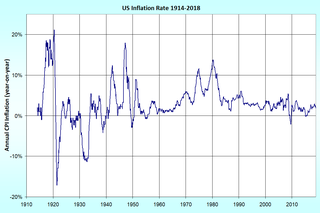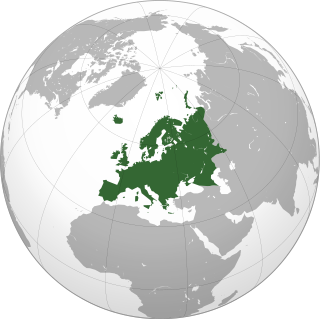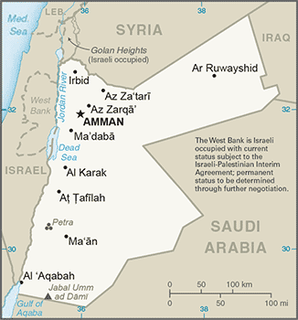
Sparsely populated in relation to its area, the Democratic Republic of the Congo is home to a vast potential of natural resources and mineral wealth. Despite this, the economy has declined drastically since the mid-1980s.

The economy of Uruguay is characterized by an export-oriented agricultural sector and a well-educated work force, along with high levels of social spending. After averaging growth of 5% annually during 1996–98, in 1999–2002 the economy suffered a major downturn, stemming largely from the spillover effects of the economic problems of its large neighbors, Argentina and Brazil. In 2001–02, Argentine citizens made massive withdrawals of dollars deposited in Uruguayan banks after bank deposits in Argentina were frozen, which led to a plunge in the Uruguayan peso, causing the 2002 Uruguay banking crisis.

In economics, inflation is a sustained increase in the general price level of goods and services in an economy over a period of time. When the general price level rises, each unit of currency buys fewer goods and services; consequently, inflation reflects a reduction in the purchasing power per unit of money – a loss of real value in the medium of exchange and unit of account within the economy. The measure of inflation is the inflation rate, the annualized percentage change in a general price index, usually the consumer price index, over time. The opposite of inflation is deflation.
Human capital is the stock of knowledge, habits, social and personality attributes, including creativity, embodied in the ability to perform labor so as to produce economic value. Human capital theory is closely associated with the study of human resources management as found in the practice of business administration and macroeconomics. The original idea of human capital can be traced back at least to Adam Smith in the 18th century. The modern theory was popularized by Gary Becker, an economist and Nobel Laureate from the University of Chicago, Jacob Mincer, and Theodore Schultz. As a result of his conceptualization and modeling work using Human Capital as a key factor, the Nobel Prize for Economics, 2018, was awarded (jointly) to Paul Romer who founded the modern innovation-driven approach to understanding economic growth.

A developed country, industrialized country, more developed country, or more economically developed country (MEDC), is a sovereign state that has a developed economy and advanced technological infrastructure relative to other less industrialized nations. Most commonly, the criteria for evaluating the degree of economic development are gross domestic product (GDP), gross national product (GNP), the per capita income, level of industrialization, amount of widespread infrastructure and general standard of living. Which criteria are to be used and which countries can be classified as being developed are subjects of debate.
Economic development is the process by which a nation improves the economic, political, and social well-being of its people. The term has been used frequently by economists, politicians, and others in the 20th and 21st centuries. The concept, however, has been in existence in the West for centuries. "Modernization, "westernization", and especially "industrialization" are other terms often used while discussing economic development. Economic development has a direct relationship with the environment and environmental issues. Economic development is very often confused with industrial development, even in some academic sources.

The category of newly-industrialized country (NIC) is a socioeconomic classification applied to several countries around the world by political scientists and economists. They represent a subset of developing country whose economic growth is much higher than other developing countries; and where the social consequences of industrialization, such as urbanization, are reorganizing society.

The aim of this page is to act as a comparison between the sovereign states of Europe regarding economic, financial and social factors.
An emerging market is a country that has some characteristics of a developed market, but does not satisfy standards to be termed a developed market. This includes countries that may become developed markets in the future or were in the past. The term "frontier market" is used for developing countries with smaller, riskier, or more illiquid capital markets than "emerging". The economies of China and India are considered to be the largest emerging markets. According to The Economist, many people find the term outdated, but no new term has gained traction. Emerging market hedge fund capital reached a record new level in the first quarter of 2011 of $121 billion. The four largest emerging and developing economies by either nominal or PPP-adjusted GDP are the BRIC countries.

Jordan prides itself on its advanced education system. Jordanians are well educated since education is considered a core value in Jordanian culture. Jordan has the highest ratio of researchers in Research and Development among all 57 Organisation of Islamic Cooperation (OIC) member states. In Jordan, there are 8060 researchers per million people, higher than the EU average of 6494, and much higher than the world average of 2532 per million.

The ease of doing business index is an index created by Simeon Djankov at the World Bank Group. The academic research for the report was done jointly with professors Oliver Hart and Andrei Shleifer. Higher rankings indicate better, usually simpler, regulations for businesses and stronger protections of property rights. Empirical research funded by the World Bank to justify their work show that the economic growth impact of improving these regulations is strong.
Informatization or informatisation refers to the extent by which a geographical area, an economy or a society is becoming information-based, i.e. the increase in size of its information labor force. Usage of the term was inspired by Marc Porat’s categories of ages of human civilization: the Agricultural Age, the Industrial Age and the Information Age (1978). Informatization is to the Information Age what industrialization was to the Industrial Age. It has been stated that:
The Knowledge Indexes were designed as an interactive tool for benchmarking a country's position vis-a-vis others in the global knowledge economy. It was created by the World Bank Institute using the Knowledge Assessment Methodology (KAM).
The following is a list of international rankings of Belarus.

Banco Bilbao Vizcaya Argentaria, S.A., better known by its initialism BBVA, is a multinational Spanish banking group based in Madrid and Bilbao. It is one of the largest financial institutions in the world, and is present mainly in Spain, Mexico, South America, United States and Turkey.








